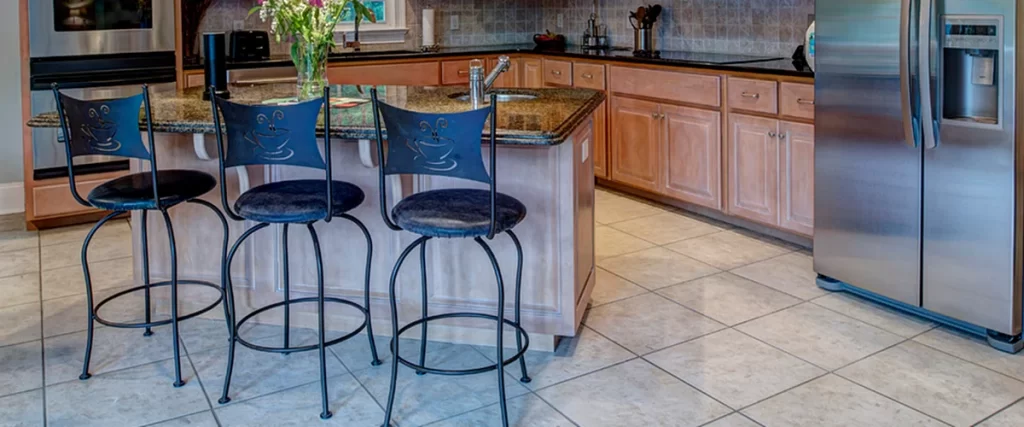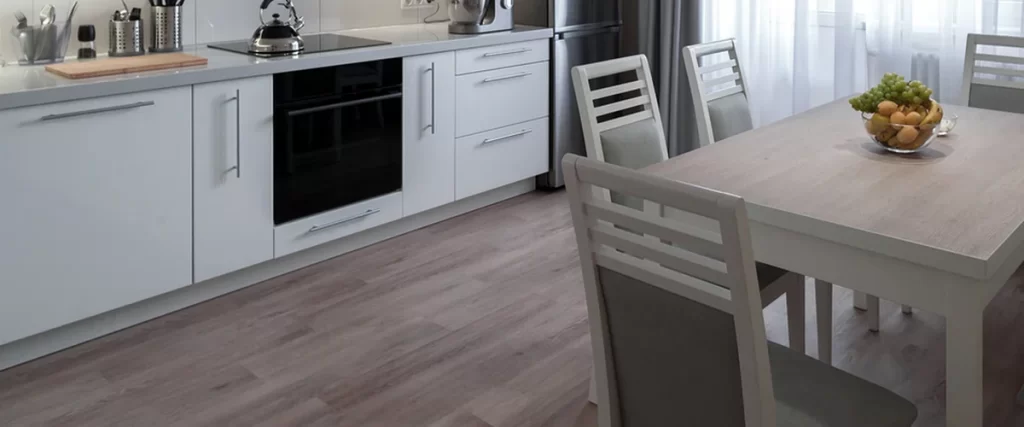When you’re renovating your kitchen, every decision feels big. And rightfully so — this is the heart of your home we’re talking about. It’s where your day starts with coffee, where your kids drop backpacks, and where friends somehow always gather when they visit.
So when it comes to choosing the right flooring, it’s not just about looks, it’s about function, durability, and how it fits your life.
The debate between vinyl vs. tile flooring comes up a lot with homeowners like you. Both are popular, both have pros and cons, but one usually edges out the other depending on your needs, budget, and how you use your kitchen.
Let’s break it down so you can confidently choose the better option for your space.

The Basics: What Are Vinyl and Tile Floors?
Before we get into the pros and cons, let’s quickly go over what these materials actually are — and how they’re made.
Vinyl is a synthetic material made primarily from PVC. Today’s vinyl is nothing like the flimsy rolls you might remember from decades ago. Luxury Vinyl Plank (LVP) and Luxury Vinyl Tile (LVT) have become go-tos in modern renovations thanks to their durability, realistic designs, and ease of installation.
Tile, on the other hand, is typically made from either ceramic or porcelain — both types of clay fired at high temperatures. It’s a tried-and-true option that’s been used in kitchens for generations. It’s durable, classic, and known for its cool, hard surface.
Which One Is More Durable?
Here’s the truth: both materials are very durable, but they shine in different ways.
Vinyl Flooring Durability
- Scratch-resistant surface — great for pets and kids.
- Waterproof options — no panic if something spills.
- Softer underfoot — it’s easier on your joints if you stand for long periods.
- Can dent if heavy appliances or furniture sit too long in one spot.
Tile Flooring Durability
- Extremely hard and resistant to scratches.
- Totally waterproof — excellent for high-moisture kitchens.
- Can crack if heavy items drop on it.
- Grout needs maintenance over time (yes, those lines between tiles!).
Winner for Durability: Tile — especially if you’re looking for a surface that can take a beating for decades.
Comfort & Feel: What’s It Like Day to Day?
This is where your lifestyle really matters. Are you cooking a lot? Do you have little kids running in and out? Do you like walking barefoot?
Vinyl Comfort
- Warmer and softer than tile.
- Somewhat cushioned feel — better for long cooking sessions.
- Less noisy when people walk on it.
Tile Comfort
- Hard and cold, especially in cooler climates or on winter mornings.
- Radiant heating can be installed underneath (but that’s a bigger investment).
- No give underfoot — might not be ideal if you’re on your feet a lot.
Winner for Comfort: Vinyl — by a mile if you’re going for a softer, cozier feel.
Installation: Which Is Easier and More Cost-Effective?
Let’s talk logistics and money, because let’s be honest, this matters a lot when you’re doing a renovation.
Vinyl Installation
- Much easier to install (click-lock systems, peel-and-stick options).
- Can be DIY-friendly.
- Typically faster and less messy.
- Less expensive labor costs.
Tile Installation
- Labor-intensive — requires cutting, grout, precise leveling.
- Definitely not a DIY project unless you’re experienced.
- Takes longer and costs more in labor.
- Subfloor prep is crucial.
Winner for Installation: Vinyl — if budget and simplicity are a factor, this wins every time.
Water and Heat Resistance
Kitchens get wet and hot — it’s just a fact of life. So how do these materials stand up?
Vinyl in Moisture & Heat
- Fully waterproof options are widely available.
- Good for spills, steam, and even occasional puddles.
- Heat resistant, but extreme temperatures can warp lower-quality vinyl.
Tile in Moisture & Heat
- Completely waterproof and heatproof.
- Steam, boiling water, dropped pots — it handles it all without breaking a sweat.
- Ideal for regions with humidity or hot summers.
Winner for Water/Heat Resistance: Tile — it’s practically indestructible in this category.
Maintenance & Cleaning
We all want a kitchen floor that’s easy to clean and doesn’t require constant upkeep.
Vinyl Maintenance
- Low maintenance.
- No grout — just sweep and mop.
- Resistant to most stains.
Tile Maintenance
- Easy to clean, but grout lines can stain or darken over time.
- Requires sealing every few years (for certain tile types).
- Tile surface itself is easy to wipe clean.
Winner for Easy Maintenance: Vinyl — especially if you don’t want to think about grout or sealing.
Cost Breakdown: What You Can Expect to Spend
Here’s what a typical homeowner might spend on average:
| Material | Material Cost (per sq ft) | Installed Cost (per sq ft) |
| Vinyl | $2–$5 | $4–$8 |
| Tile | $3–$10 | $8–$15+ |
Tile costs more overall, both for materials and installation, but it can also add more resale value in some markets. Still, if budget is tight, vinyl is a smart, stylish choice.
So… Vinyl or Tile? Here’s the Bottom Line
Choose Vinyl If:
- You want something budget-friendly.
- Comfort underfoot matters.
- You need a fast installation.
- You have young kids or elderly family members who might benefit from a softer surface.
Choose Tile If:
- You want the most durable and long-lasting option.
- You’re okay with a higher budget for installation.
- You love classic or Mediterranean-style kitchens.
- You want a surface that’s cool in hot climates.
Best Vinyl and Tile Flooring Manufacturers
When it comes to getting quality materials, it’s smart to stick with manufacturers known for performance, warranties, and design options.
Top Brands to Consider:
- Shaw Floors – Known for wide LVP ranges and strong warranties.
- COREtec – High-end luxury vinyl with realistic textures and visuals.
- Armstrong Flooring – Offers budget-friendly and durable vinyl and tile choices.
- Daltile – A trusted name in porcelain and ceramic tile with tons of style options.
- Mohawk Flooring – Well-rounded offerings in both vinyl and tile with reliable quality.
- MSI Surfaces – Popular for high-end tile and waterproof vinyl with great finishes.
Why Homeowners Trust Rise Up Renovations for Kitchen Flooring
Our team at Rise Up Renovations has been helping homeowners upgrade their kitchens for years. We’re professionals who know what works — and what doesn’t — in real homes.
We’ve seen every type of kitchen, and we know how to install both vinyl and tile the right way. If you want results that look amazing and last for years, working with pros is the smartest move you can make. The right team will save you money in the long run by avoiding costly mistakes and re-do’s.
Ready to get your kitchen project started? Contact us at (816) 970-9256 and let’s make it happen!

Frequently Asked Questions
Is vinyl flooring really waterproof?
Yes! Most modern vinyl flooring — especially LVP and LVT — is 100% waterproof, making it perfect for kitchens.
Can tile crack over time?
Tile is very durable, but yes, it can crack if something very heavy drops on it. Proper installation helps prevent this.
How long do vinyl floors last in a kitchen?
High-quality vinyl flooring can last 10–20 years or more with good care.
What kind of maintenance do tile floors need?
Regular sweeping and mopping is easy. Grout may need resealing every few years to keep it looking fresh.
Is it safe to install vinyl over existing flooring?
Often, yes — as long as the existing floor is level and in good shape. We’ll inspect it during your consultation.
Do tile floors feel cold?
They can, especially in cooler climates. But radiant heating can be installed underneath for cozy warmth.
Which option adds more resale value?
Tile tends to edge out vinyl in terms of perceived value, but high-quality vinyl can still impress buyers.
Can I install either of these myself?
Vinyl might be DIY-friendly if you’re handy. Tile? Not so much. It’s best left to professionals.
Final Thoughts
Choosing between vinyl and tile comes down to how you live, what you value, and how much you’re ready to invest. Both are excellent choices, but when you work with professionals like the team at Rise Up Renovations, you’re going to love the end result no matter what.
If you’re ready to talk kitchen remodeling, contact us today at (816) 970-9256. Let’s transform your kitchen into a space that works for you.
